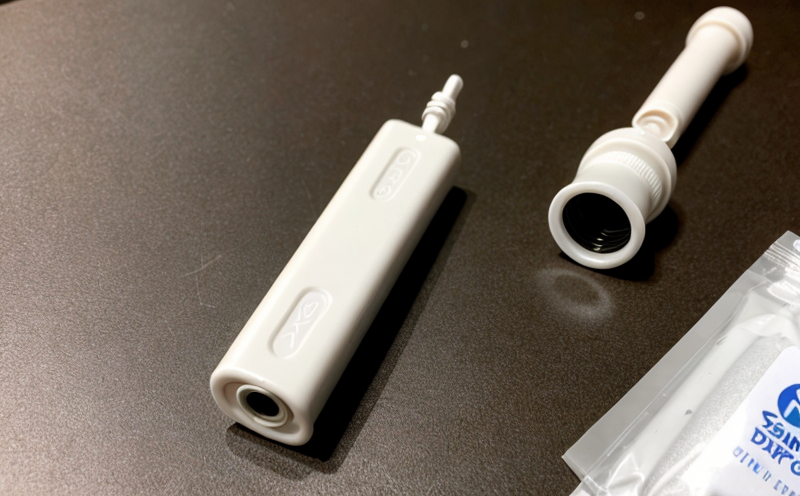ISO 11137 Radiation Sterilization Validation Testing
The ISO 11137 standard provides a framework for validating radiation sterilization processes used in medical device manufacturing. This rigorous testing ensures that devices are effectively sterilized without compromising their integrity or performance. Compliance with this standard is crucial for manufacturers aiming to meet regulatory requirements and ensure product safety.
ISO 11137 defines three main phases: the establishment of dose levels, the validation of sterilization parameters, and the assessment of biocompatibility. Each phase is critical in ensuring that the sterilization process meets the stringent standards set by international regulations such as ISO 10993-12 for biocompatibility.
The first step involves determining the required radiation dose needed to achieve sterility while maintaining device functionality. This typically requires extensive testing on various types of devices, including complex assemblies and multi-component systems. The second phase focuses on validating the sterilization process itself by exposing test samples to controlled radiation levels under defined conditions. The third phase assesses biocompatibility through a series of in vitro tests.
Our laboratory follows these steps meticulously using state-of-the-art equipment and methodologies, ensuring accurate and reliable results. We employ experienced technicians who understand both the theoretical aspects and practical applications of ISO 11137. This approach allows us to provide comprehensive validation services that not only meet but exceed industry expectations.
By adhering strictly to the guidelines provided by ISO 11137, we ensure that each sterilization process is thoroughly validated before it can be implemented in production environments. This process reduces risks associated with potential failures during product life cycles and enhances overall quality assurance efforts within companies operating in this highly regulated field.
Our commitment to precision and reliability extends beyond just technical execution; it also includes providing detailed documentation that supports all aspects of the validation process. Our reports are meticulously prepared, ensuring they contain all necessary information required by regulatory bodies like FDA or EU MDR.
In summary, ISO 11137 radiation sterilization validation testing is an essential part of medical device development and manufacturing processes. It guarantees product safety while maintaining high standards for quality control throughout the supply chain.
Customer Impact and Satisfaction
Ensuring compliance with international standards like ISO 11137 plays a pivotal role in enhancing customer satisfaction and trust in our services. By adhering to these stringent requirements, we demonstrate our commitment to delivering top-notch quality products that meet all necessary regulatory expectations.
For manufacturers, meeting such rigorous testing protocols not only helps them avoid costly delays but also strengthens their reputation among healthcare providers who prioritize patient safety above all else. Our thorough validation processes provide assurance that every single device leaving the factory is safe and effective for use in clinical settings.
We understand that maintaining a robust quality management system is key to long-term success in this competitive industry. Therefore, we work closely with customers throughout the entire process—from initial consultation to final report generation—to ensure they have all the necessary tools and resources available to make informed decisions about their sterilization processes.
Our approach goes beyond mere compliance; it focuses on providing value-added insights that can help improve existing procedures or identify areas for improvement. We believe in building lasting relationships with our clients based on mutual respect, transparency, and collaboration. This partnership-driven model ensures continuous improvement in both product quality and service delivery.
International Acceptance and Recognition
The ISO 11137 standard is widely recognized across the globe as a benchmark for validating radiation sterilization processes used in medical device manufacturing. Its acceptance by regulatory authorities such as FDA (United States), MHRA (UK), TGA (Australia), and MHLW (Japan) underscores its significance within the industry.
Adherence to this standard ensures that manufacturers can confidently market their products internationally, knowing they have met the highest standards of quality assurance. Regulatory bodies often seek compliance with ISO 11137 when reviewing applications for new devices or modifications to existing ones.
The widespread adoption of these guidelines reflects a shared goal among countries to protect public health by ensuring that medical devices are safe and effective. By aligning their practices with internationally accepted standards like those outlined in ISO 11137, manufacturers contribute to this global effort towards safer healthcare solutions.
Use Cases and Application Examples
The application of ISO 11137 radiation sterilization validation testing is particularly relevant for single-use and disposable medical devices due to their critical role in patient safety. Here are some specific use cases where this service would be beneficial:
Single-Use Catheters: These delicate instruments must undergo rigorous testing to ensure they remain sterile until opened by the user. Our laboratory can simulate real-world conditions under which these catheters might be exposed, ensuring their integrity remains intact throughout the sterilization process.
Vascular Prostheses: Complex assemblies like vascular prostheses require careful validation of both the overall structure and individual components. We use advanced imaging techniques to verify that even minute changes caused by radiation do not affect the device's performance or safety profile.
Implantable Devices: For devices intended for long-term use inside patients, it’s crucial to maintain consistency in sterilization methods across different batches of materials. Our testing ensures uniformity and repeatability, providing assurance that each batch meets the same high standards.
Bioabsorbable Materials: With increasing demand for biodegradable implants, there is an added layer of complexity when it comes to validating sterilization processes. We have specialized protocols in place to handle these unique materials without compromising their properties post-sterilization.
Advanced Polymer Composites: Modern medical devices often incorporate advanced polymer composites that may behave differently under radiation exposure compared to traditional materials. Our expertise allows us to accurately assess the impact of sterilization on such cutting-edge technologies.





